
MINERALOGICAL MAGAZINE
Scope & Guideline
Bridging Knowledge Gaps in Geochemistry and Petrology
Introduction
Aims and Scopes
- Mineral Discovery and Description:
The journal regularly publishes detailed studies on newly discovered minerals, including their crystal structures, chemical compositions, and classification within existing mineralogical frameworks. - Experimental and Theoretical Mineralogy:
Research that employs experimental techniques, such as high-temperature and high-pressure studies, as well as theoretical modeling, contributes significantly to understanding mineral behavior under various conditions. - Mineral Classification and Nomenclature:
The journal actively engages with the International Mineralogical Association's Commission on New Minerals, Nomenclature and Classification, facilitating discussions and updates on the classification and nomenclature of minerals. - Geochemistry and Mineral Formation Processes:
Studies exploring the geochemical processes involved in mineral formation, alteration, and the mobility of elements during geological processes are a core focus area, providing insights into mineral genesis. - Environmental and Economic Geology:
The journal includes research on the economic significance of minerals, including their extraction and environmental impacts, highlighting the importance of sustainable practices in mineral resource management. - Interdisciplinary Approaches:
The integration of mineralogy with other scientific disciplines, such as petrology, geochemistry, and environmental science, is encouraged to foster a holistic understanding of mineral systems.
Trending and Emerging
- Mineral Synthesis and Experimental Techniques:
There is a notable increase in papers focusing on the synthesis of new minerals in laboratory settings, utilizing advanced experimental techniques to explore their properties and potential applications. - High-Pressure and High-Temperature Studies:
Research investigating mineral behavior under extreme conditions is gaining traction, providing insights into the stability and transformations of minerals in the Earth's interior. - Environmental Mineralogy:
An emerging focus on the environmental implications of minerals, including studies on mineral weathering, biogeochemical cycles, and the role of minerals in pollution mitigation, reflects growing ecological awareness. - Digital Mineralogy and Data Analysis:
The adoption of digital tools and data analysis techniques, such as machine learning for mineral classification and characterization, is becoming increasingly prominent, showcasing the integration of technology in mineralogy. - Mineral Resources and Sustainability:
Research addressing the sustainable extraction and management of mineral resources is on the rise, emphasizing the need for environmentally responsible practices in mining and mineral processing.
Declining or Waning
- Traditional Mineralogy:
Research focused solely on traditional descriptive mineralogy, without integrating modern analytical techniques or interdisciplinary approaches, appears to be declining as the field evolves. - Minerals in Historical Context:
Papers exploring the historical aspects of mineralogy, such as mineral collections or historical mining practices, have become less frequent, possibly due to a shift towards more applied and contemporary studies. - Mineralogical Surveys of Well-Studied Regions:
Surveys and studies of mineral occurrences in regions that have already been extensively documented are decreasing, as researchers focus on more novel locations or unexplored mineral assemblages. - Static Mineral Properties:
Research concentrating on static properties of minerals, such as basic crystallography without context of environmental conditions or applications, is waning in favor of dynamic studies that consider mineral behavior under variable conditions.
Similar Journals
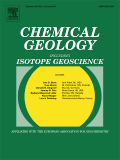
CHEMICAL GEOLOGY
Connecting Theory and Practice in Earth SciencesChemical Geology is an esteemed international journal published by Elsevier, dedicated to the rigorous exploration of geochemistry and petrology, with its foundational roots tracing back to 1966. As evidenced by its impressive Q1 ranking in both Geochemistry and Petrology as well as Geology in the 2023 category quartiles, this journal stands as a premier outlet for cutting-edge research and innovative methodologies within these vital fields. With a Scopus rank placing it in the top 10% of Earth and Planetary Sciences, Chemical Geology offers a platform for researchers, professionals, and students alike to disseminate findings that advance our understanding of geological processes and materials. Although it does not currently offer open-access options, the journal remains committed to high-quality publications that contribute significantly to the scholarly community. Located in the vibrant academic milieu of Amsterdam, Netherlands, Chemical Geology is an essential resource for those engaged in the earth sciences, aiming to bridge theoretical insights with practical applications.

LITHOLOGY AND MINERAL RESOURCES
Bridging Knowledge Gaps in Mineral ExplorationLITHOLOGY AND MINERAL RESOURCES, published by PLEIADES PUBLISHING INC, is a specialized journal dedicated to advancing knowledge in the fields of economic geology, geochemistry, and petrology. With its ISSN 0024-4902 and E-ISSN 1608-3229, this journal has established itself as a critical resource for scholars and practitioners alike, examining the intricate relationships between lithology and mineral deposits, and their implications for resource management. As indicated by its positioning in the Q3 quartile for both economic geology and geochemistry and petrology in 2023, the journal is recognized for its valuable contributions to the scientific community, ranking #28 out of 43 in Economic Geology and #112 out of 154 in Geochemistry and Petrology according to Scopus. The journal's publication history reveals a rich tradition of excellence, as it has been continuously contributing to the field from 1984 to 2024. While it does not offer open access options, researchers and practitioners can easily engage with its robust body of work in effective ways to support their own studies and applications. The importance of LITHOLOGY AND MINERAL RESOURCES lies in its commitment to publishing high-quality research that informs practices in mineral exploration and environmental stewardship, making it an essential resource for anyone invested in the future of earth sciences.

ACTA PETROLOGICA SINICA
Advancing the Science of Earth's MaterialsACTA PETROLOGICA SINICA, published by SCIENCE PRESS, is a distinguished journal in the field of geochemistry and petrology, known for its commitment to advancing the understanding of Earth's materials and processes. With an impact factor ranking it in the second quartile (Q2) of its category and a respectable Scopus rank of 64 out of 154, this journal serves as a vital platform for researchers, professionals, and students alike, facilitating the dissemination of innovative studies and findings from 1980 to the present. Its robust editorial board and diverse array of articles make it an invaluable resource for those engaged in the intricate analysis of petrological phenomena and geochemical transformations. Published in China, ACTA PETROLOGICA SINICA provides access to significant original research, reviews, and insights essential for advancing knowledge and fostering collaboration in the earth sciences.
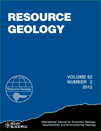
RESOURCE GEOLOGY
Decoding the Interplay of Geology and ResourcesRESOURCE GEOLOGY, published by WILEY, is a peer-reviewed journal that serves as a vital platform for the dissemination of innovative research in the fields of geology and geochemistry. With an ISSN of 1344-1698 and e-ISSN 1751-3928, the journal has steadily contributed to the academic community since its inception in 1996, continuing through its planned convergence in 2024. With a Q3 ranking in both Geochemistry and Petrology and Geology categories, RESOURCE GEOLOGY is positioned within the competitive landscape of Earth and Planetary Sciences, ranked 164th and 93rd in its respective categories on Scopus, reflecting its significant contribution to the body of knowledge in these fields. While not an open-access journal, it provides access to essential research that advances our understanding of natural resources and geological processes. The journal is dedicated to publishing high-quality articles that appeal to researchers, professionals, and students looking to deepen their insight into the intricate interplay between geological phenomena and resource management.

PETROLOGY
Navigating the Complexities of Earth’s MaterialsPETROLOGY is a significant journal in the field of Geochemistry and Petrology, published by PLEIADES PUBLISHING INC in the United States. With an ISSN of 0869-5911 and an E-ISSN of 1556-2085, this journal has established itself as a valuable resource since its inception in 1996, continuing to provide insights into various aspects of petrology and geochemical processes through to 2024. It holds a Q3 ranking in the 2023 category quartiles for Geochemistry and Petrology, placing it within the academically relevant tier of journals as recognized by Scopus. Although it does not currently offer open access, the journal remains accessible to researchers, professionals, and students eager to explore the intricate relationships between mineral compositions and geological phenomena. By publishing high-quality research and reviews, PETROLOGY plays a crucial role in advancing knowledge, contesting existing paradigms, and fostering discussions on both fundamental and applied topics within the petrology domain.
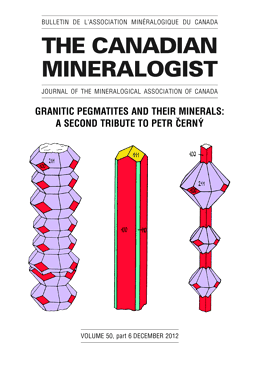
CANADIAN MINERALOGIST
Connecting Global Minds in MineralogyCANADIAN MINERALOGIST is a prestigious academic journal published by the Mineralogical Association of Canada, primarily focusing on the fields of Geochemistry and Petrology. Established in 1980, this journal has fostered a rich tradition of scholarly communication, offering a platform for researchers from around the world to share significant advancements and findings related to mineral science. With an impact factor that reflects its relevance within the scientific community, the journal occupies a notable position, ranked in the Q3 quartile within its category according to the 2023 assessments. The E-ISSN 1499-1276 ensures that online access is readily available, making it easier for readers to engage with cutting-edge research. With its headquarters in Quebec, Canada, CANADIAN MINERALOGIST not only contributes to the academic landscape in North America but also plays a vital role globally in advancing the understanding of mineralogy. Its commitment to high-quality publishing supports both the dissemination of knowledge and the nurturing of a vibrant scientific community.
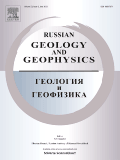
Russian Geology and Geophysics
Connecting Knowledge and Innovation in Earth SciencesRussian Geology and Geophysics is a seminal journal published by GEOSCIENCEWORLD that plays a pivotal role in the dissemination of vital research within the realms of Earth-Surface Processes, Geology, and Geophysics. With an ISSN of 1068-7971 and an E-ISSN of 1878-030X, this journal has witnessed a continuous evolution since its convergence in 2007 and is poised to thrive through 2024. While it is not an Open Access journal, it is recognized for its significant contributions to the academic community, holding a respectable Q2 ranking in Earth-Surface Processes and Q3 rankings in both Geology and Geophysics as of 2023. The journal’s impact factors align it within competitive quartiles, marking it as an essential resource for researchers and professionals seeking to stay at the forefront of geological and geophysical sciences. By publishing high-quality peer-reviewed articles, the journal fosters an environment of knowledge sharing and innovation, making it indispensable for students, practitioners, and scholars alike who are dedicated to advancing our understanding of Earth's complex systems.
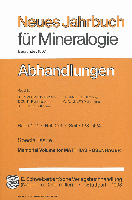
NEUES JAHRBUCH FUR MINERALOGIE-ABHANDLUNGEN
Documenting the evolution of mineralogical research.NEUES JAHRBUCH FUR MINERALOGIE-ABHANDLUNGEN, published by E Schweizerbart'sche Verlagsbuchhandlung in Germany, is a distinguished scholarly journal dedicated to advancing the fields of mineralogy and petrology. With an ISSN of 0077-7757, it provides a platform for researchers to disseminate high-quality findings that contribute to our understanding of Earth sciences. Although it currently has no open access options, the journal remains vital for professionals seeking to engage with impactful research in geochemistry and petrology, as reflected in its 2023 Scopus ranking in the 21st percentile within its category. The journal has documented significant research from 1980 to 1988 and resumed from 1996 to 2023, making it a crucial archive for historical and contemporary studies. Despite its current Q4 quartile ranking, NEUES JAHRBUCH FUR MINERALOGIE-ABHANDLUNGEN is an important contributor to the academic discourse in its field, and it invites researchers, professionals, and students alike to explore and submit their work that drives innovation and understanding in mineralogical studies.
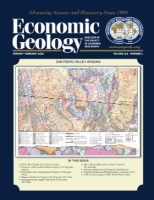
ECONOMIC GEOLOGY
Leading the Way in Earth and Planetary SciencesECONOMIC GEOLOGY, published by the Society of Economic Geologists, Inc., is a premier journal dedicated to the field of economic geology, geochemistry, petrology, geology, and geophysics. With a significant legacy dating back to 1905 and converging into 2024, this journal has established itself as a leading source of research and knowledge in the geosciences, recognized for its high-quality, peer-reviewed articles that reflect the latest advancements in the discipline. Having achieved an impressive impact factor and categorized in the top Q1 quartiles, it ranks among the foremost journals in various related fields, including Earth and Planetary Sciences—where it particularly excels in geophysics (Rank #5) and geochemistry (Rank #6). Although it currently does not offer open access options, its rigorous publication standards ensure that the research disseminated significantly contributes to the understanding and exploration of geological resources. This journal is essential reading for researchers, professionals, and students who seek to deepen their knowledge and stay at the forefront of economic geology.
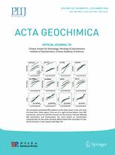
Acta Geochimica
Exploring the Earth's Secrets, One Element at a Time.Acta Geochimica is a prominent academic journal published by SPRINGER INT PUBL AG, focusing on the dynamic fields of Geochemistry and Petrology. Established in 2016, this peer-reviewed publication has quickly gained recognition within the scientific community, currently holding a category quartile ranking of Q3 in Geochemistry and Petrology as of 2023. With its ISSN 2096-0956 and E-ISSN 2365-7499, the journal offers a platform for researchers and professionals to disseminate and discuss significant advancements in the study of the chemical composition of the Earth and other celestial bodies. While it is not an open-access journal, Acta Geochimica plays a vital role in fostering collaboration and innovation among scientists, contributing to a deeper understanding of geochemical processes. Located in Switzerland at Gewerbestrasse 11, Cham CH-6330, Switzerland, this journal is a critical resource for students, researchers, and professionals seeking to push the boundaries of knowledge in Earth sciences.